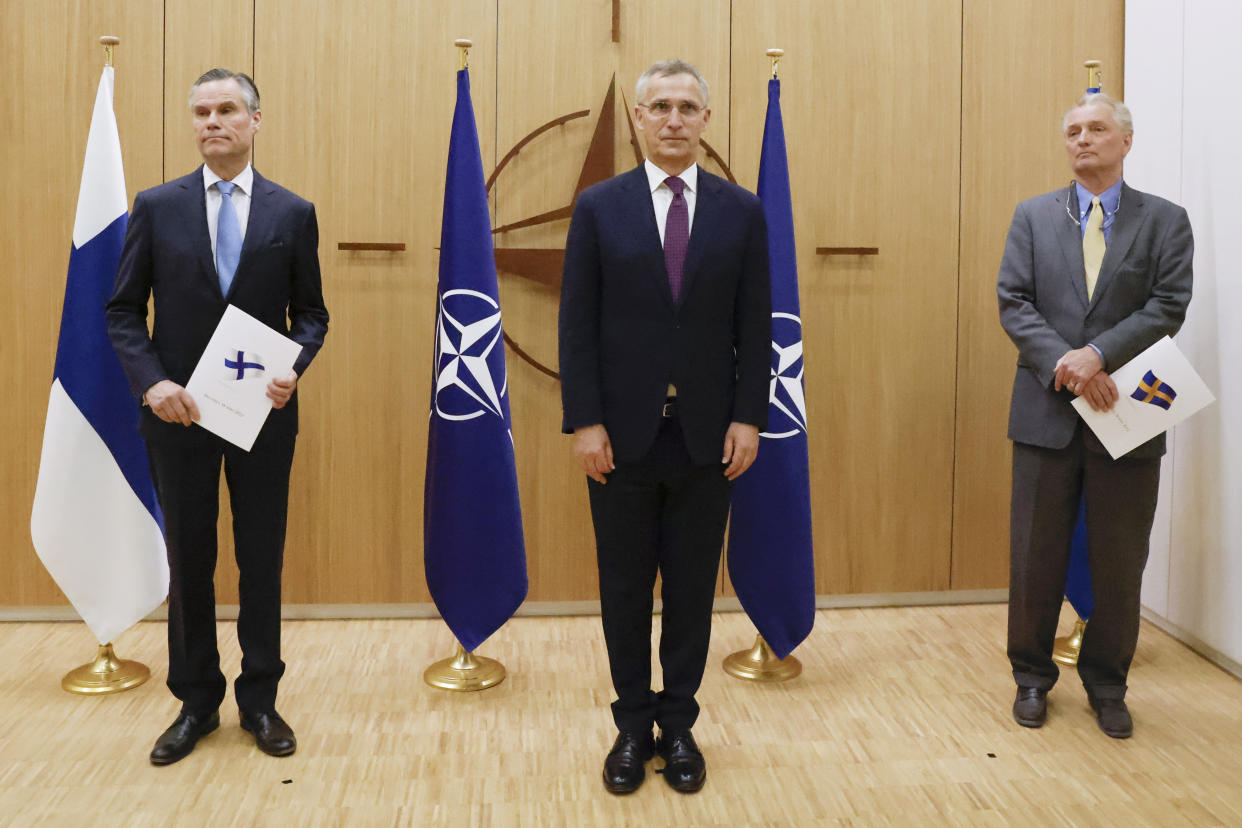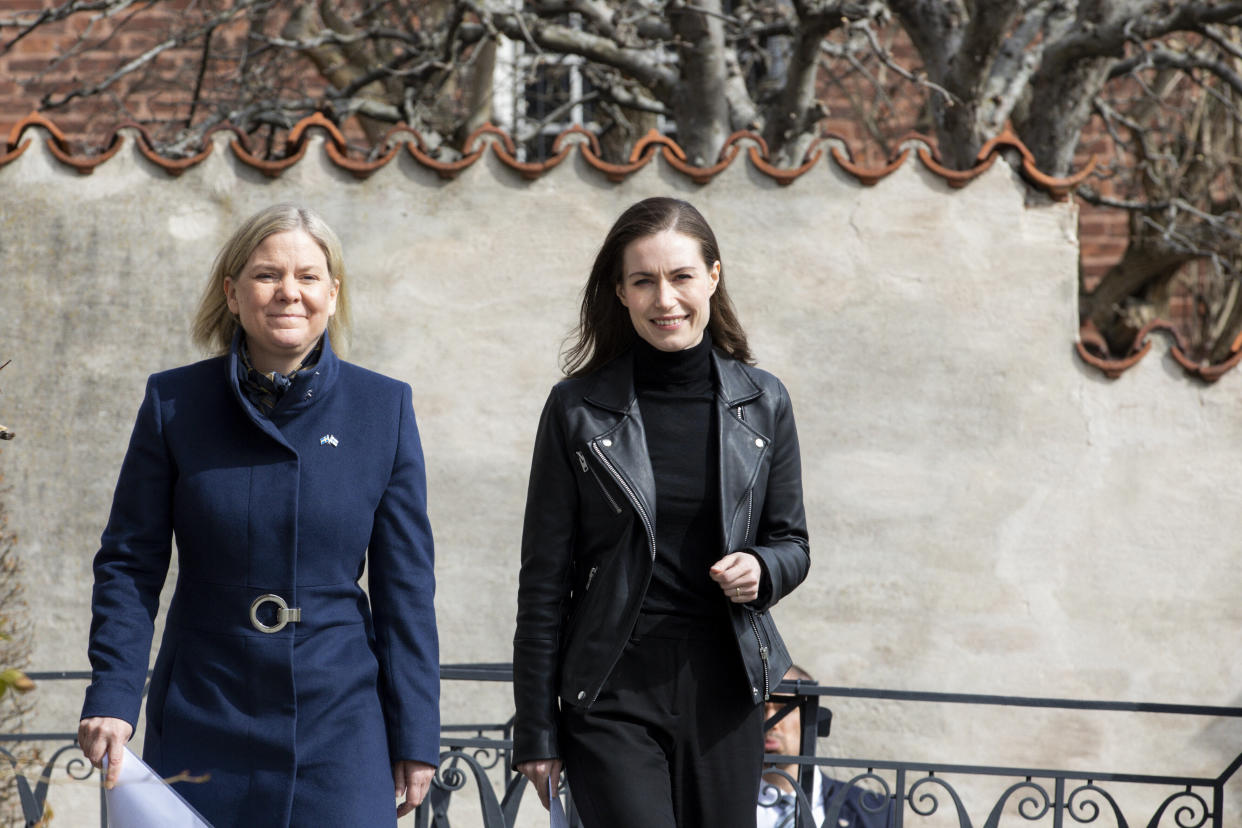How Putin's war in Ukraine backfired and fueled NATO's Nordic expansion
Things have not gone to plan for Vladimir Putin.
In December, the Russian president demanded that Ukraine ditch its bid to join NATO, the Transatlantic military alliance founded after WWII to counter the power of the Soviet Union, and that NATO forces retreat from Russia’s western flank.
Instead, with Putin’s military suffering stumbles and setbacks on the ground in Ukraine, his grander geopolitical goals are also falling apart.
Far from discouraging NATO expansion, Russia’s actions look set to double the length of its border with member nations, from the Arctic Circle to the Baltic Sea, and create a new frontier in its clash with the West.
Finland and Sweden formally submitted their membership applications in Brussels on Wednesday morning, ending long-held neutral stances that for Stockholm stretches back 200 years to the time of Napoleon.
The process of joining will take months and must be ratified by NATO’s 30 members. One member, Turkey, has already threatened to block both countries’ bids: Turkish President Recep Tayyip Erdogan on Monday criticized Sweden and Finland for their stance on terrorism, a possible veiled reference to perceived inaction over Kurdish fighters who have sought refuge in the two countries.
However, NATO Secretary-General Jens Stoltenberg has warmly welcomed the dual application and said over the weekend that “Turkey has made it clear that their intention is not to block membership.” Germany’s top diplomat, Annalena Baerbock, has also voiced confidence the pair will be admitted.

It looks clear that two more nations with advanced, well-funded, multipurpose armed forces will soon join the mutual assurance of NATO’s Article 5, under which all member nations must defend an attack against another.
Finland had become such a byword for neutrality that the “Finlandization” of Ukraine was discussed as a compromise solution that Russia might accept to stave off war. Now Finland — and its Swedish neighbors — could be key new members of the Western alliance.
In three short months, analysts say, the invasion of Ukraine has reworked European security for decades to come — and not in Putin’s favor.
“I think it’s a total political and geostrategic game-changer, for northern Europe at least,” said Kate Hansen Bundt, secretary general of the Norwegian Atlantic Committee, a think tank based in Oslo.
“Putin’s getting the opposite of what he demanded in December. He wanted to close NATO’s open door, and now he has opened it wide for two new members.”

The Russia-Ukraine War has produced no shortage of potentially defining moments in modern European history.
Germany rewrote its defense policy with a $113 billion spending spree, the European Union and its allies are pledging to ban Russian oil, and the West is funding the Ukrainian resistance in the east of the country after Russia aborted its initial goal of taking Kyiv and other major cities.
But the enlargement of NATO encapsulates perhaps the most important change so far: the uniting of Europe against an despotic and expansionist Russia, following years of appeasement and the hope that Russia would change or could be tamed through free trade.
Alexander Stubb, a former prime minister of Finland, has advocated NATO membership for 30 years. “Better late than never,” he told NBC News.
“Putin is essentially creating a divide in Europe — on one side you have an isolated, authoritarian, aggressive, imperialist and revisionist Russian, and on the other you have more or less 40 European democracies that believe in cooperation, fundamental human rights and the rule of law,” he said by phone last week.
“This is not about NATO, this is about European values. Putin cannot stand liberal Western values. He thinks they are decadent.”
Despite Finland and Sweden’s erstwhile neutrality, both nations have quietly built up significant military defenses — enough to permanently change the face of NATO’s deterrent powers in northern Europe and particularly around the Baltic Sea.
The Baltic nations — Estonia, Latvia and Lithuania, all of which were annexed by the Soviet Union — warmly welcomed Finland’s indication that it would seek NATO membership. Latvia’s foreign minister told the Financial Times on Friday, with a hint of relief: “The Baltic Sea becomes a NATO sea.”
Finland boasts one of the largest and most well-prepared armies in Europe, with 280,000 troops mobilized and some 900,000 reservists, plus an extensive navy and air force and an advanced intelligence operation.
Finnish thinking on national security has been a combination of idealism and realism, Stubb said. The idealism was the attempt to trade and cooperate with Russia in the hope of bringing Moscow into the sphere of normal international relations.
“But the realism has been to keep up one of the largest armies in Europe for a rainy day — of course, now that rainy day has come,” he said.
Sweden has far fewer troops, with around 55,000 in its armed forces. But it has a strong air force and controls the island of Gotland in the Baltic Sea, a strategically crucial site that would help establish naval supremacy in the event of a regional conflict.

Retired four-star Gen. Philip Breedlove, a former supreme commander of NATO and commander of the U.S. Air Force in Europe, has advocated the enlargement of NATO and told NBC News this month that if it was left to him, they would be invited to join “about 1 minute after they applied.”
“These two nations have worked very diligently to be almost completely compatible with NATO,” he said. “Their equipment is compatible, their tactics, techniques and procedures are all compatible.”
The road to deciding on NATO membership has not been smooth for either nation, particularly Sweden, which has made its neutrality a matter of national pride. The influence of its neighbor has been crucial — more than three quarters of Finns now support NATO membership, and the enthusiasm is contagious.
“The Finns made us do it — that’s very true,” said Roger Svensson, a visiting senior fellow at the German Marshall Fund, based in Stockholm.
“After the Second World War, the Finns have been very, very pragmatic. It’s easier for Finland to make this 180-degree turn than Sweden — it [neutrality] is so much part of Swedish identity.”
Without the war in Ukraine and Putin’s incendiary demands about the future of NATO, Svensson doubts Sweden would have changed its stance:
“Ukraine is the trigger point,” he said, adding that “Putin has pushed us over the line.”

A poll in April found 57 percent of Swedes supported NATO membership — an extraordinary shift since the start of the conflict and even since March, when support was around 50 percent.
The Kremlin reacted swiftly to Finland’s announcement this week, promising a “military-technical” response. Putin told a meeting of the military alliance of former Soviet states Monday that while he wasn’t threatened by NATO’s expansion northward, the “expansion of military infrastructure into this territory would certainly provoke our response.”
This threat of retaliation underlines the need for a security alliance for NATO’s supporters, however.
The U.K. and other nations have promised to come to the defense of Finland or Sweden should they face attack during the application process. “He might be shrewd and he might have miscalculated, but he’s not suicidal,” Stubb said of Putin.
“If the Russian army is incapable of taking Ukraine, you have to be really out of your mind to contemplate attacking a NATO country at this stage.”
